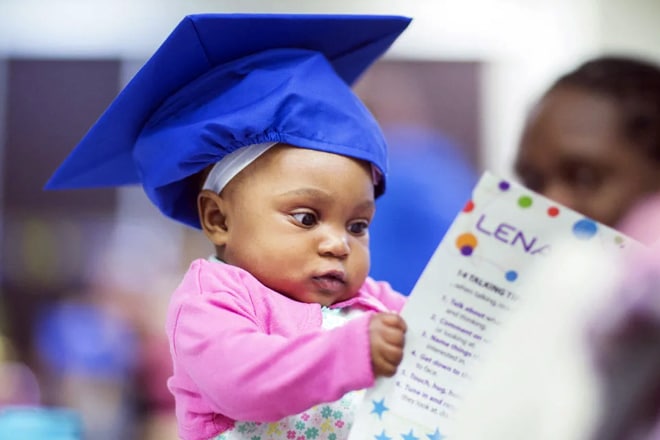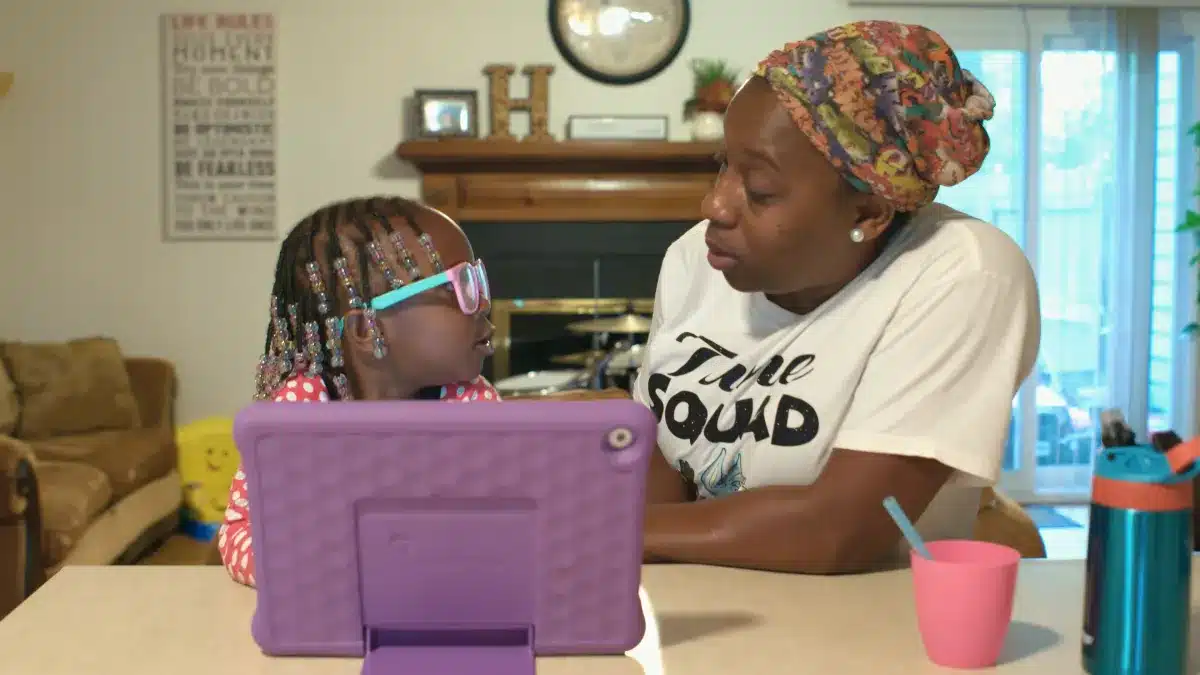This post was originally published March 6, 2023, and has been updated to include a video clip featuring film director Jenny Mackenize.
“The Right to Read,” a documentary film from director Jenny Mackenzie and executive producer LeVar Burton, is a call to action for early literacy in the United States. Through its exploration of the causes behind declining third-grade reading proficiency, the film follows an activist, a teacher, and two families on their journey to ensure our youngest learners can read.
Both families — the Hunters in Virginia Beach, Va., and the Adams-Staples family in Memphis, Tenn. — are former participants in LENA Start.
LENA Start, powered by LENA’s “talk pedometer” technology, is a community program designed to help families learn how to increase conversational turns with their children during the first few years of life. The film highlights an ongoing conversation about how reading is taught in U.S. schools. While the evidence clearly supports explicit phonics instruction, research also indicates that the foundations of learning to read begin much earlier than kindergarten. Namely, research shows that well-developed language skills build to strong reading skills later on. Learning to talk and learning to read and write happen in parallel — and the foundations of learning to read get built earlier than you might think.
“An early language story in a film about the early literacy crisis”
In a film about reading delays among kindergarteners, first-graders, and second-graders, why shine such a bright light on that all-important birth-to-five time frame? In a recent webinar called Foundations of Literacy: The Science of Reading, Mackenzie joined Rebecca Parlakian, Senior Director of Programs at ZERO TO THREE, and other literacy experts to deliver an answer:
“It is life-changing!”
Teresa Hunter and her husband, Isaiah, enrolled in LENA Start with their daughter Ivy when she was just two months old. The film catches up with the Hunters when Ivy is a chatty and precocious almost-two-year-old, and again when she’s calling out the names of letters from flash cards at three. The same goes for Melinda Staples and her husband, Fred. Their son, Fred, Jr., was also a LENA Start baby, and the film features him as a four-year-old pre-K student, beginning more explicit reading instruction.
After graduating from the LENA Start program, both Teresa Hunter and Melinda Staples went on to build their expertise in early childhood development. They both became LENA Start facilitators themselves, leading groups of parents through the program.
“It is life-changing!” Hunter said of the program in an interview with a local news station. “I’m not just saying that as a parent who took the program. I’m saying that from parents that I taught.”
LENA Start is implemented in Virginia Beach by the city’s GrowSmart initiative. GrowSmart coordinator Barb Lito said, “GrowSmart has led innovative early education support for children and adult caregivers of young children for decades. This focused investment supports the healthy development and school readiness of children, creating a strong foundation for future education and life success.”
In Memphis, the University of Memphis’s Coordinated Effort to Enhance Development (CEED) program coordinates LENA Start. Dr. Loretta Rudd, CEED project director, said “If I had all the money in the world, I would want every single family to be able to participate in LENA.”
- Ivy Hunter was an infant when her parents Teresa and Isaiah participated in LENA Start through the Virginia Beach GrowSmart initiative.
- Ivy was featured with her mom in the documentary “The Right To Read” when she was a few years older.
How to watch the documentary
- Visit https://www.therighttoreadfilm.org/ to learn about upcoming screenings of the film and to request a screening in your community.
Further reading and watching
- This interview with director Jenny Mackenzie and executive producer LeVar Burton is a great resource for understanding the filmmakers’ motivation.
- This peer-reviewed research paper out of Columbia University used LENA technology to draw connections between interactive talk in a child’s first few years of life and the kind of brain growth associated with later reading skills.
- In a webinar hosted by LENA in late 2023, Jenny Mackenzie joined Lucy Hart Paulson, Sonia Cabell, and other experts to discuss the connection between early language environments and literacy outcomes.







